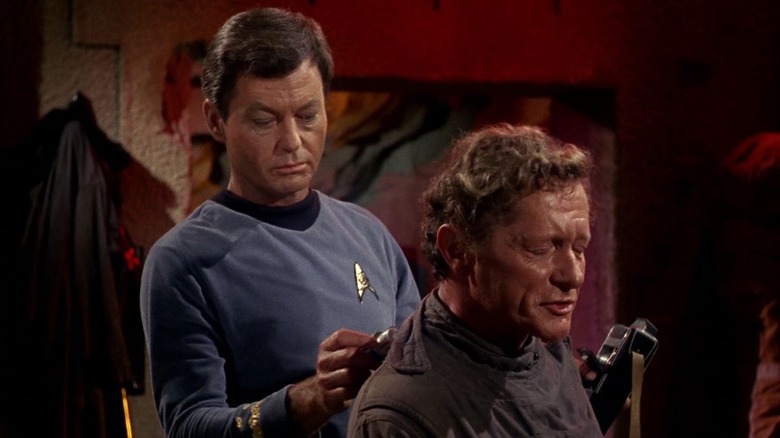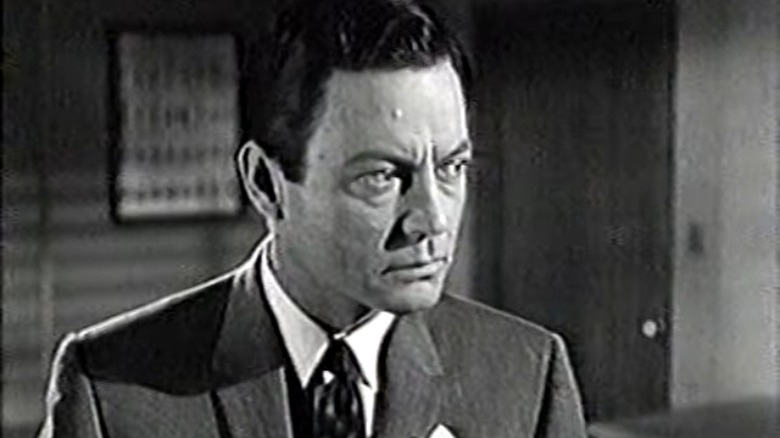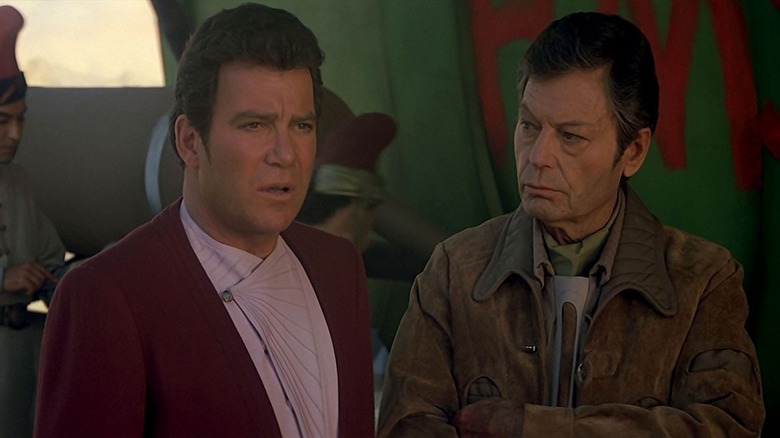The Failed Gene Roddenberry Series That Led To DeForest Kelley's Star Trek Casting
Prior to his gig on "Star Trek" in 1966, actor DeForest Kelley spent 20 years traversing the wild and hoary world of episodic television and appearing in supporting roles in little-regarded feature films. His first professional screen acting job was a one-off performance in the one-season 1947 TV series "Public Prosecutor." The series holds the distinction of being the first-ever mainstream televised series to be released on film, instead of being broadcast live, which was standard at the time.
Between that show and "Star Trek," Kelley appeared on over 80 TV shows, often just in single episodes, but sometimes returning for two or three. He also had bit roles in films like "Variety Girl," "The Men," "Taxi," and "Gunfight at the O.K. Corral," playing Morgan Earp. He was just a hardworking character actor, taking the jobs that were offered him. There is an integrity to that approach.
In 1960, Kelley appeared in an episode of "Alcoa Theater," an hour-long anthology drama series that featured new characters every week. One of the episodes, "333 Montgomery Street," was initially intended to be a pilot for a legal TV series but the show wasn't picked up and the pilot was repurposed. The show was based on a novel called "Never Plead Guilty" by real-life lawyer Jake Ehrlich, and it followed a hotshot defense lawyer named Jake Britten, clearly an analog for the author. Britten rejected the death penalty and fought hard to exonerate his clients and get their sentences reduced. Kelley played Britten. The episode was written by Gene Roddenberry, the creator of "Star Trek."
Back in 1986, Kelley was interviewed for "Star Trek IV: The Voyage Home," and he talked briefly about "333 Montgomery Street" and how it put him in Roddenberry's orbit. When Trek came along, Kelley was more likely to be included.
DeForest Kelley and the forgotten 333 Montgomery Street pilot
It should also be noted that Roddenberry had an equally prolific TV career prior to "Star Trek" as Kelley. Most notably, he wrote 24 episodes of "Have Gun — Will Travel." He, like Kelley, took the jobs in front of him and aspired to larger projects. He and Kelley worked together for the first time on "333 Montgomery Street" in 1960, and then again in a pilot for another unsold TV series called "Police Story." In "Police Story," Kelley played the lab technician character for the LAPD. The series also starred future "Star Trek" actors Grace Lee Whitney and Malachi Throne.
In 1986, Kelley recalled his early Roddenberry gigs and credited their failure for the eventual rise of "Star Trek." Kelley said:
"I had, in 1960, done a pilot ['333 Montgomery Street'] for Gene Roddenberry, in which I portrayed a criminal lawyer from San Francisco, who was a master lawyer. It was a marvelous series, but like a lot of things that Gene does, it was a bit far out and the network did not accept it. So that was my first experience with Roddenberry. I did another pilot for him called 'Police Story.' For the benefit of those of you who don't know, Gene was a cop for about eight years. He wrote a wonderful pilot that we made. Again, it didn't sell."
For the time, Roddenberry was pretty progressive, and it's likely the studios were a little skittish about making shows that openly lambasted the death penalty. Kelley pointed out that, perhaps ironically, he wasn't in either of the "Star Trek" pilot episodes, neither "The Cage," nor "Where No Man Has Gone Before." In the former, the Enterprise's doctor was played by John Hoyt. In the latter, Paul Fix.
Star Trek was a change of pace for DeForest Kelley
"Police Story" may have tanked, but the fact that Kelley was playing a kindly, decent character got the studio's attention. In those 20 years before "Star Trek," Kelley hadn't played too many heroic figures, usually playing villains and scumbags. "Police Story" proved the actor's range. He said:
"[W]hen 'Star Trek' came along he wanted me for the series, but I had been doing these very nasty guys and the network could not picture me in that role. He ran up against a stone wall. Now, I was shooting 'Police Story' while they were doing the William Shatner pilot ['Where No Man Has Gone Before']. So, 'Police Story' went out for reactions, and as a result of the reaction process, I got a high rating. And, oddly enough, I was not portraying a heavy. I was playing a police criminologist. And the network informed Gene that they had changed their mind. So I entered 'Star Trek' on the first episode."
The rest is history. Dr. McCoy appeared in 76 episodes of the original "Star Trek" series, 22 episodes of "Star Trek: The Animated Series," and six "Star Trek" feature films. He may not have been in either of the original "Star Trek" pilot episodes, but the imbalance was redressed somewhat in 1987 when he played a very elderly Dr. McCoy in the pilot for "Star Trek: The Next Generation." It was, also perhaps fittingly, his final TV gig.
His final movie, meanwhile, was 1998's "The Brave Little Toaster Goes to Mars." Kelley passed in 1999 at the age of 79. R.I.P.


